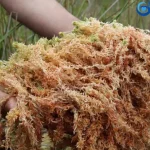Generally, in the growing world of natural remedies, seaweed has emerged as a superstar with many health benefits. But can this marine wonder help relieve the heavy burden of anxiety and depression?
As more people seek holistic approaches to mental wellness, the potential link between seaweed and mood disorders is gaining attention. However, do you know Is sea moss good for anxiety and depression?
Let’s dive into the depths of this intriguing topic and explore whether seaweed holds the promise of calming a troubled mind.
What is anxity and depression?
Generally, anxiety and depression are two different mental problems. But they can be intertwined. Basically, anxiety is a feeling of worry, apprehension, and restlessness that occurs naturally in everyday life.
Generally, when this anxiety becomes excessive and chronic, it can develop into a mental illness. Depression is sadness, depression, and difficulty in pleasure or interest.
In particular, it can also cause physical problems, such as fatigue, sleep problems, and loss of appetite. Both anxiety and depression are treatable. If you think you may have this problem, talk to a mental health professional.
Can anxiety be controlled naturally?
In general, mindfulness techniques are a natural way to help manage anxiety. Basically, practising mindfulness involves focusing on the present moment and acknowledging your thoughts without judgment.

By incorporating mindfulness into your daily routine, you can learn to better manage anxious thoughts and feelings.
Also, another effective natural method to control anxiety is regular exercise. Physical activity releases endorphins, known as the body’s natural mood elevators.
Engaging in activities like yoga, running, or dancing can help reduce stress levels and improve overall mental well-being.
Additionally, in addition to mindfulness and exercise, maintaining a healthy diet rich in fruits, vegetables, and whole grains can also naturally play a role in managing anxiety.
Certain foods like blueberries, almonds and spinach contain nutrients that have been shown to have a calming effect on the body.
By making small changes to your lifestyle and incorporating these natural techniques, it is possible to keep anxiety at bay without relying solely on medication.
Is sea moss good for anxiety and depression?
Sea moss, also known as Irish moss. Originally, it gained popularity for its potential benefits in supporting mental health. Rich in essential nutrients like magnesium and potassium, seaweed can help regulate neurotransmitters that are responsible for mood regulation.
Generally, studies suggest that these minerals may play a role in reducing symptoms of anxiety and depression by promoting relaxation and improving cognitive function.
Additionally, the high iodine content in seaweed supports thyroid function, which is closely linked to mood stability.
Furthermore, seaweed contains compounds with anti-inflammatory properties that may help reduce oxidative stress in the brain and protect against neuronal damage associated with anxiety and depression.
In addition, the presence of amino acids such as taurine and glycine in seaweed supports cognitive function and may aid in stress management.
Thus, including seaweed in your diet can provide a natural way to support mental well-being and promote overall mental resilience.
Can we cure anxiety permanently?
Anxiety, in general, is a common mental health condition. It can, in fact, significantly affect a person’s quality of life. While there is no one-size-fits-all answer to whether anxiety can be permanently cured, there are various strategies and approaches to effectively manage and alleviate its symptoms.
Traditional treatment methods often include therapy and medication. Therapy, such as cognitive-behavioral therapy (CBT), helps individuals understand and manage their anxious thoughts and behaviors.
In particular, medications such as antidepressants or anti-anxiety medications may provide temporary relief from symptoms but may not address the underlying causes of anxiety.
However, holistic approaches focus on treating the whole person, including lifestyle changes, mindfulness practices, and alternative therapies such as acupuncture or yoga.
These approaches aim to promote overall well-being and address the root causes of anxiety rather than just managing symptoms.
Furthermore, building a strong support network, embracing personal growth, and addressing underlying trauma or environmental factors can contribute to long-term healing and resilience against anxiety. Although I discussed it above, Is sea moss good for anxiety and depression?
What foods are good for anxiety and depression?
Seaweed is gaining popularity for its potential benefits for managing anxiety and depression. Generally, this nutrient-dense seaweed is rich in vitamins, minerals, and antioxidants that support brain health and mood regulation.
In particular, including foods like salmon, walnuts, and greens in your diet can have a positive effect on anxiety and depression. These foods contain omega-3 fatty acids, known to support brain function and improve mood.
Additionally, probiotic-rich foods like yogurt or kefir can help improve gut health, which plays an important role in mental well-being.
Overall, maintaining a diet rich in whole foods that provide essential nutrients can be beneficial for managing symptoms of anxiety and depression.
While seaweed shows promise as a natural remedy for these conditions, combining it with other nutrient-dense foods can further support overall mental health.
How do I relax my mind from overthinking?
Generally, overthinking can be overwhelming and detrimental to your mental well-being. Here are some techniques to calm your mind and free yourself from the cycle of overthinking:
Practice mindfulness
Engage in mindfulness techniques such as meditation or deep breathing exercises. These exercises can help you focus on the present moment and reduce anxious thoughts.
Limit screen time
Try to minimize screen exposure, especially before bed. Excessive screen time can stimulate your mind and increase overthinking. Instead, engage in relaxing activities such as reading or listening to calming music.
Challenge negative thinking
In general, identify and challenge negative or irrational thoughts that contribute to overthinking. Ask yourself if there is evidence to support these thoughts and if they are helpful or harmful. For this, I have already discussed: Is sea moss good for anxiety and depression?
By incorporating these techniques into your daily routine, you can train your mind to become more resilient to overthinking and develop a greater sense of inner peace.
Frequently Asked Questions
Is sea moss good for anxiety and depression?
Seaweed is rich in nutrients like magnesium and potassium, which can support overall mental well-being. Although it is not a cure, incorporating it into a balanced diet can potentially offer some benefits for anxiety and depression.
Why is sea moss good for anxiety?
Seaweed contains nutrients like magnesium and potassium, which support brain health and help regulate mood. These properties may contribute to its potential benefits for anxiety relief.
Is anxiety a lifelong condition?
Anxiety is not necessarily a lifelong condition for everyone. With the right treatment, support, and coping strategies, many individuals can effectively manage and even reduce the impact of anxiety on their lives.
Are there natural remedies for anxiety?
There are natural remedies for anxiety, such as mindfulness practices, exercise, herbal supplements such as lavender or chamomile, and techniques such as deep breathing or progressive muscle relaxation.
Last Few Words
Finally, seaweed shows promise as a natural remedy for anxiety and depression due to its high nutritional content and potential mood-regulating properties.
Although more research is needed to fully understand its effects on mental health, incorporating seaweed into a balanced diet may provide some relief for those struggling with the condition.
So, It is important to consult with a healthcare professional before making any significant changes to your treatment plan.
Overall, adding seaweed to your routine can offer a holistic approach to managing symptoms of anxiety and depression.













